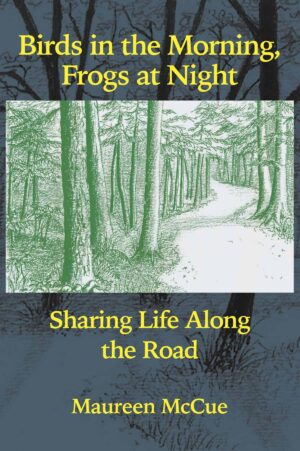Paul Deaton: The author creates a sense of place that is hers alone and explains its risks and rewards. We see life along her road with all its wonder and tragedy.
I met Maureen McCue, who just published a memoir Birds in the Morning, Frogs at Night: Sharing Life Along the Road, when we were both on the Johnson County Board of Health in 2006.
As soon as McCue arrived to become the board’s physician, she drove us to become quite busy both with required tasks like replacing the director, and voluntary initiatives like educating other county boards of health on the effects of coal-fired power plants on human health. Given our shared history, I didn’t know what to expect when her memoir was released earlier this year.
While much in the book is familiar, the author’s interpretation of events is fresh. The road in the title, along which life is shared, was the same one I drove many times to get to their home: all without incident or specific inspiration. I recall when the bridge was out and had to take the long way around. It was a road, a conveyance. Or was it? The central assertion of the book is it was more than that, a metaphor for a path forward from environmental degradation.
It is a book worth reading for a couple of reasons.
McCue creates a sense of place that is hers alone and explains its risks and rewards. We see life along her road with all its wonder and tragedy. There are a number of Grade B roads in the county, yet she made hers special by describing animal and plant life along with changing weather in which she found herself. She attempted to connect it to the broader world she experienced in international travel as a physician. One experiences the sense of place in the writing. That alone is enough to make Birds in the Morning, Frogs at Night worth reading.
Life along the road includes their adopted son Michael who has special needs, or as McCue put it, “The diagnosis according to specialists that day was ‘mild to moderate’ mental retardation.” Over the years I spent time with Michael. He is a unique person and a familiar face around the county. While I feel I know Michael well, it is unclear what (if anything) he remembers of me when I approach him to engage. McCue’s narrative about caring for Michael is compelling and an engaging read for people with special needs children.
When professors and instructors leave university, many have written books. Stow Persons’ The University of Iowa in the Twentieth Century, D.C. Spriesterbach’s The Way it Was: The University of Iowa 1964 – 1989, and others come to mind. I asked McCue about this retirement, book-writing phenomenon. She answered, “I’ve asked myself the same question, but it’s not so much about writing after retirement, it’s more like having the time and will to get it published — this book and it’s parts were weaving there way out of me over a long time. Writing happens whenever, but following it to the publisher takes a different kind of mind set and time line facilitated by retirement.”
There is an obvious comparison between Birds in the Morning, Frogs at Night: Sharing Life Along the Road and Cornelia F. Mutel’s 2016 book A Sugar Creek Chronicle: Observing Climate Change from a Midwestern Woodland. McCue and Mutel are friends and share many elements in their lives, McCue said. I wouldn’t want to pick between them so I advise reading both.
Birds in the Morning, Frogs at Night: Sharing Life Along the Road is published by Ice Cube Press. Find it by clicking here.

